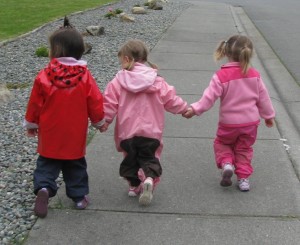Today’s play, the value of friends for kids, is inspired by a meeting. When leaders call their meeting The Three Amigos or Friends, they send a loud message, that of the significance of friendship. Together, Canada, Mexico, and the United States have over 487 million people. The issue of closer understanding and connection is the basis for trade, finance, and everything else.
And the value of friends is an issue for young children too. Children have both real friends and imaginary ones. This quote is from Insights for Parents: Midnight Monsters and Imaginary Companions. Dr. Lawrence Kutner says, “Imaginary companions are an integral part of many children’s lives. They provide comfort in times of stress, companionship when they’re lonely, someone to boss around when they feel powerless, and someone to blame for the broken lamp in the living room. Most important, an imaginary companion is a tool young children use to help them make sense of the adult world.” There are advantages to real friends too and roots of friendship grow deep.
Making friends will be easy for some kids, and harder for others. Children all have their own unique mix of strengths and challenges. A few relationships skills are making eye contact, sharing, taking turns, starting conversations with new people, and being able to ask others to join in. Like other skills, these friendship ones can be learned and they get better with practice.
As parents and caregivers, some ways that we can support children to make friends are to read books, share stories, and modelling how to be a friend. We also need to give kids opportunities to try out what they know about being a friend. Playdates is only part of the experience. In Banish the Playdate, Dadncharge writes, “This idea that two kids playing together has to be an event is altering the spontaneity of our children.” Playgrounds, libraries, and community events, like sitting outside and watching fireworks, are places where kids may spontaneously meet other kids and be friendly.

In the spirit of the example by our countries’ leaders, and the recognition of the value of friends for kids, is there some time for your child to play with friends today?
